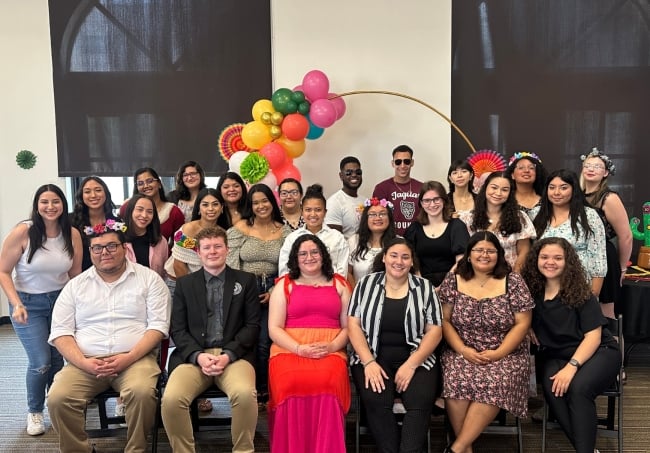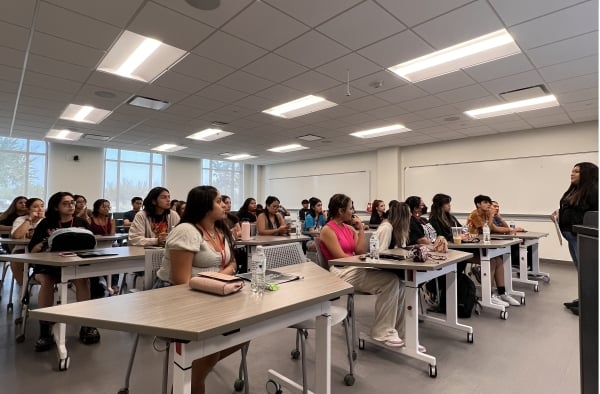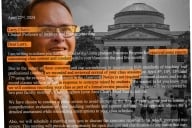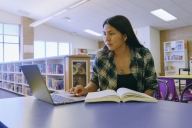You have /5 articles left.
Sign up for a free account or log in.

Texas A&M University at San Antonio requires its peer leaders to meet high levels of standards and undergo over 200 hours of training and preparation.
Texas A&M University, San Antonio
Over half of colleges with a first-year seminar (FYS) program embed peer mentors into the experience, providing near-peer experience and engagement to incoming students.
At Texas A&M University at San Antonio (TAMUSA), an overhaul of the first-year seminar resulted in an expanded focus on peer leadership and how the first-year experience (FYE) can provide leadership opportunities and professional development to returning students.
Through the experience, peer leaders gain key competencies including communication, critical thinking, inclusion and self-awareness through completing 250 hours of training and professional development, as well as on-the-job learning. TAMUSA staff credit peer leaders with helping decrease DFW rates within the first-year seminar and helping new students foster feelings of belonging.
Onboarding: To be a peer mentor, students must hold at least a 2.75 semester/cumulative GPA and have completed at least one semester at the university, says Jessica S. Reynolds, director of the first-year experience. Additionally, students had to have earned an A or B in their own first-year seminar course.
Students can apply in the fall or spring semester for the upcoming term. Students submit a résumé and cover letter, as well as complete a phased interview process. Each peer leader is paid $11 an hour, working 19 hours a week for 50 weeks out of the year.
Once hired, students complete a four-week training and one-on-one training over the summer.
The summer training address theories including student development theories, social change model, Yosso’s cultural wealth model and first-year student data, as well as exercises such as roleplaying, first-year seminar prep, team building exercises, classroom management and office procedures and expectations.
One-on-one support helps students identify their strengths, plus guides them through the peer leader handbook and fine tunes office duties.
The training also includes extensive belonging and inclusion work, with discussions on disability support services, fostering advocacy training, suicide prevention, Title IX, student counseling and more.
On the ground: Each peer leader will work in one or two first-year seminar courses, providing a one-on-one meeting with each student and leading three or four of their own lessons during the term.
“They essentially function as professional staff,” Reynolds says.

Peer leaders teach first-year seminar courses at Texas A&M University at San Antonio, and help instructors co-teach during other class sessions.
Texas A&M University at San Antonio
TAMUSA offers over 40 sections of the first-year seminar each fall and an additional 10 or so in the spring. The three-credit hour course covers academic skills, campus involvement and career exploration, among other topics.
To continue their growth and training, peer leaders also complete a weekly check-in with the instructor and a weekly meeting that is team bonding in the fall and spring and professional development starting in the spring.
After the first term, students participate in a one-week winter training in January, which involves team building, event planning, presentations, semester prep, belonging initiatives (formerly referred to as diversity, equity and inclusion) training and setting semester goals.
To keep the role for the next academic year, all students go through a rehire interview process. Students also help lead the new peer leader recruitment process and sometimes serve on the adjunct faculty hiring process.
The impact: The extensive training pays off, Reynolds says.
At the end of the term, peer leaders say they’re confident in submitting CARE and Title IX reports and in guiding students to other on-campus resources, as well as advocating for themselves in the classroom and engaging with their co-instructor in the FYS. Students put on over 20 events during the academic year, as well as serve as peer mentors and coordinators for the FYE office.
Ultimately, peer leaders are able to connect their skills to their future careers, in addition to feeling more open-minded and caring in their interactions with others.
One of the other benefits of these peer leaders is that they are demographically diverse and representative of the overall campus community, helping first-year students feel as though they belong at the university. Year-over-year, TAMUSA saw DFW rates in the first-year seminar drop from 29.3 percent to 23.7 percent in fall 2023 and Reynolds says she is certain the peer leaders were a factor in this change.
If your student success program has a unique feature or twist, we’d like to know about it. Click here to submit.
Editor's Note: This article has been updated to reflect current language used at TAMUSA to refer to diversity, equity and inclusion initiatives, per Texas law.








